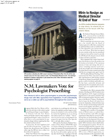There’s stormy weather ahead for the country’s health care system. In fact, Susan Dentzer, health care correspondent for “The News Hour” on PBS, likened the current situation to the plot of the movie “The Perfect Storm,” in which a number of conditions converge to create a devastating hurricane.
Dentzer offered that analogy at a panel titled “The Economic and Political Winds Shaping the Future of our Health Care System” at the National Health Action 2002 conference sponsored by the health advocacy group Families USA. The conference was held in Washington, D.C., in January.
She described the causes of the looming health care storm as a slowing economy exacerbated by the impact of the events of September 11, health care costs increasing at double-digit rates, transformation of federal and state budget surpluses into deficits, and increasing numbers of people without health insurance.
Only two days earlier, discussants at the 2002 National Health Policy Conference, sponsored by Health Affairs and the Academy for Health Services Research and Health Policy (AHSRHP), sounded similar themes about a health care system in disarray.
Policy analyst Gail Wilensky, former administrator of the Health Care Financing Administration, told the conference attendees that 2002 might be called 1991 revisited. Predictions are, according to Wilensky, that if present trends continue, the country will be spending 16 percent to 17 percent of its gross domestic product (GDP) on health care by the end of the decade.
Analysts made similar predictions in 1991, but the general economy expanded, and the growth in health care spending was partially contained by managed care practices.
Today, according to Wilensky, the economy is floundering, and both the public and private sectors are backing away from managed care cost-containment measures.
What’s Next?
Bruce Bradley, director of Health Plan Strategy and Public Policy at General Motors Corporation, said the increase in health care costs is a “huge crisis” for corporations competing in the global marketplace.
Insurance plans offered through General Motors cover over 1 million employees, retirees, and their families. The company spends about $4 billion a year on health care benefits.
General Motors is looking at value purchasing and trying to measure quality and effectiveness. The company is a leader in The Leapfrog Group, a new organization founded by the Business Roundtable to reduce preventable medical mistakes by giving consumers the information they need to make informed health care choices.
Helen Darling, president of the Washington Business Group on Health, also mentioned a trend toward getting consumers more involved in making cost-effective health care decisions. She cited results of a survey that showed 80 percent of employers plan to make greater use of Internet technology to administer benefits and distribute health care information.
Employers will support “highly targeted” health care expenditures that promote productivity, but will insist on evidence of the efficacy of the initiatives, according to Darling.
Consumer Power
Jon Gabel, vice president of health systems studies at the Health Research and Educational Trust, agreed with Darling, saying “The era of heavily managed care is over, and the next stage is consumer-driven health care.”
He thinks that consumers will have more power to design their own benefit packages by selecting among health coverage options and health care professionals. They will, however, pay a price for that new freedom. Deductibles generally will increase, and plans will become tiered, with consumers paying more if they want expanded choice of clinicians and coverage.
Oregon’s Governor John Kitzhaber, M.D. (D), believes that after a period in which the country has been “lulled into complacency by the strong economy of the 1990s and by the short-term cost savings produced by managed care,” cost and access issues will again occupy the center of the national political stage.
Transcripts from both conferences are available at www.kaisernetwork.org. ▪
